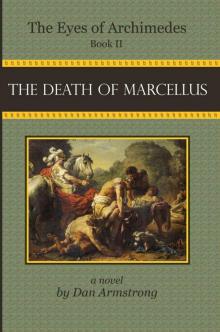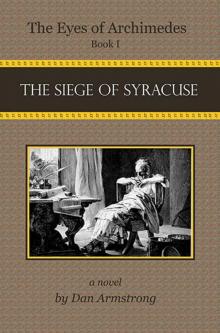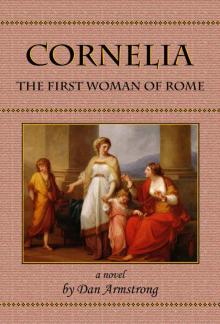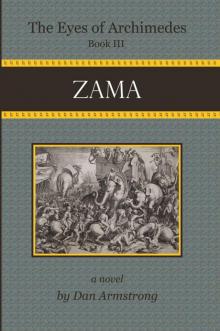- Home
- Dan Armstrong
The Siege of Syracuse Page 7
The Siege of Syracuse Read online
Page 7
Hektor had no children and spoke of his wife only as the target of some comic remark. I never saw her; rumor had it she was three times his girth. Hektor regularly made uncouth comments about the women in the kitchen, but they put up with it because he had a heart. He squeezed them and pinched them with an ugly familiarity and always seemed to have a hand at his groin, but he also stood up for the staff and was a good boss in spite of his penchant for jocularity—which to the uninitiated could be quite embarrassing.
“Timon, have you ever made love to a woman?” he asked one afternoon during my first week.
I had returned to the kitchen with a tray full of dishes and stood at the sink cleaning them. I was quite innocent for thirteen and didn’t like the question, especially with several women nearby. I pretended not to hear. He shouted it a second time.
“Have you ever put your Johnny in the hopper, Timon?”
I knew I couldn’t ignore him, so I made it short. “No.”
Hektor shook his head in mock sadness. “So you do it with your hand?” He accented the question with a pumping gesture. This elicited a bit of tittering from the three young female slaves in the kitchen. Agathe and Lavinia ignored it.
“No!” I repeated, my anger sparking to the surface.
More giggling only made me feel worse, but Hektor caught my none-too-slave-like tone. He crossed the room to where I had my hands in the water. He stuck his hand beneath my tunic and goosed me from behind, causing me to jerk my hands from the sink and throw water all over myself. This inspired the chorus of laughter Hektor sought. I wanted to slug him or run from the room in embarrassment. Instead I stood at the sink, my face dripping with water, and continued to work.
Hektor put a hand on my shoulder. “Not even once?”
I couldn’t contain my emotions. “Never,” I said through gritted teeth, fighting all the feelings that had yet to be resolved within me.
He knew he’d touched a nerve. He was close enough to see the tears pooling in my eyes. He leaned into my ear and whispered with a kindness I did not expect, “Learn to accept my ribbing, Timon, and you and I will get along just fine.” He followed this with a gentle warning. “You’ll find it better than a lengthy flogging.”
I finished the dishes as quickly as I could and returned to the welcome silence of my master.
Beyond Hektor’s unsettling sense of humor, the one recurring subject of speculation in the kitchen was the king’s health. Those living closest to Hiero, the administrative staff who worked for him and the slaves who waited on him, knew his generosity and kindness from daily contact. The staff was paid well and the slaves were not abused. Fair treatment had been the foundation of Hiero’s rule for fifty years. Everyone on the staff worried how that might change when the king died.
Among the slaves, the handmaids and stewards saw the king in some capacity every day. They knew as well as anyone how he felt. They could see what he had left on his plate. They emptied his chamber pot. Quite often they were there when the doctor visited, and they would always report to the other workers what they had seen. This information gradually found its way to the island kitchen. Morale rose and fell with the king’s health, which was slowly, but steadily declining.
CHAPTER 8
Six weeks passed with little to no real communication between myself and Archimedes. He was kind when he made his infrequent requests, but mostly it was as though I wasn’t there. I had a deeper relationship with Plato, who on rare occasions allowed me to pet him. I dearly wished Laius Aufidius would come to visit so he could remind the mathematician that I was there to help. Even as a daydreaming youth I considered hard work better than wall-eyed boredom.
There were many objects in the room I wanted to prod and poke, but I had restrained myself for fear of getting into trouble. One particular contrivance, though, was so interesting it made my fingers itch for closer inspection.
Sitting on a wooden table in the far corner of the room was a large brass globe, about the diameter of a round of cheese. It sat on a pedestal with a pivot, suggesting it could turn. Mounted around it on brass hoops were seven smaller globes, ranging in size from an olive to a small melon. Beside this brass apparatus stood a tall ceramic tank with a stopcock. I stared at the globes and the tank constantly, trying to imagine their function.
On this one morning, however, as Archimedes sketched out a geometric proof on a piece of papyrus and my boredom mounted like a fever, the lure of the contraption drew me closer and closer. All of a sudden I found myself standing within arm’s length. My curiosity boiling over, I reached out and touched the largest globe, then immediately pulled my hand back and looked over my shoulder to see if Archimedes had noticed. No, he was deep into whatever geometric shapes he was drawing.
I reached out again to the large globe, and thinking surely it must rotate, gave it a little prodding. To my amazement, the quarter turn I gave the globe made the balls around it move as well. The boy in me was captured by this fantastic toy. Forgetting the presence of my master, I pushed the large globe around one full turn, sending all the small globes into even greater motion around the large one. Oh my, what a contrivance! I pushed the globe around another time, and another, thoroughly captivated by this curious machine—whatever it was.
“Timon.” My master called from across the room.
I pulled my hand away from the machine and tried to appear as though I hadn’t touched it. Archimedes’ one good eye was aimed at me.
“Yes, master.”
“There’s a pail beneath that table. Is there any water in it?”
I leaned forward to look. “Yes, some,” I said, knowing he must have seen me turning the globe, but uncertain whether it had displeased him or not.
“Go fill it.”
I took the pail out to the stairway landing. There was a cistern on the tower’s roof. A terracotta pipe extended from the cistern down through the stairwell to the kitchen. Water could be obtained at each landing by turning a stopcock in the pipe. I opened the stopcock and filled the pail.
When I returned to the workshop, Archimedes stood beside the apparatus. “Pour all of that water into this tank.” He pointed to the ceramic vessel beside the collection of revolving brass globes.
I lifted the pail up over my head and carefully poured the water into the tank.
“Put the pail on the floor where it was.”
I did as he said, still uncertain if I had angered him.
“Have you ever thought about the movement of the planets through the heavens?” Archimedes asked. His voice, though deep, was soft and thoughtful. His eyes—one blank white, one green—were framed by tiers of loose skin.
“My father spoke to me many times about the stars and the planets.”
He tilted his head with interest at my response, then turned the stopcock at the bottom of the ceramic vessel. Water from the tank began to drain over a small water wheel and into a trough that led back to the pail beneath the table. The water wheel was connected to the large globe and caused it to turn—and with it all of the others, as when I had used my hand.
“This is a called a terrella, Timon. It’s meant to model the motion of the planets. There isn’t another one like it anywhere.”
If I was curious before, now I couldn’t take my eyes off the marvelous device—turning there on its own, each globe moving on a different path and at a different pace.
“Which globe do you think represents the Earth?” Archimedes asked.
“My father told me the Earth was at the center of the universe and that everything else, the Sun, the planets, the stars, revolved around it.”
Archimedes nodded. “Many of the most respected astronomers would say the same, but there’s a book by Aristarchus of Samos that suggests the Sun is at the center of the universe. I was thinking of Aristarchus when I had this terrella built.” He touched the second largest globe. “This would be the Earth. This is the Moon.” One by one he touched the globes. “Then Mercury, Venus, Mars, Jupiter, and Saturn.”<
br />
I wasn’t entirely convinced. “I can see, master, that the falling water makes the spheres go around because of the water wheel and the gears and pivots. That’s amazing enough. I have never seen a machine with such small parts. But what of the real planets? What supports them? There are no wire hoops in the heavens to hold them up. No gears to make them spin.”
Archimedes smiled like a kindly grandfather. “That may be one of the most fundamental questions we can ask, Timon. And I don’t know the answer. There’s clearly no water wheel in the heavens,” he said, taking a moment to watch the terrella turn. “I often wonder if the motion of the planets is somehow related to that which makes the water run from the tank to the bucket.”
Plato had been drawn out of the shadows by the sound of the trickling water. He sat a few feet away now, watching the globes move, apparently more suspicious than fascinated by the strange contraption.
“You mean, like—what makes a stream flow downhill?”
“Precisely.” Archimedes picked up a small wooden ball from a nearby table. He dipped it into the bucket of water. “Usually when we spin a ball, say a wet ball, drops of water fly away from it.” He held the ball between his forefinger and thumb and gave it a spin with his other hand. He held it up close to my cheek so I could feel the wet spray.
“In the case of the Earth, which Aristarchus also believes is spinning, we see the opposite. Things fly to it.” He took a piece of wood from the workbench and dropped it. The loud smack on the floor sent Plato racing from the room. “When we stand on the surface, only with effort can we push ourselves away.” He made a feeble jump off the floor. “And we certainly don’t see the oceans go flying away like the water from the ball. Some other principle is involved—and I believe that other principle balances the planets in the heavens and causes them to spin like water down a drain.”
“But wouldn’t it be easier, master, to believe what appears so obvious to everyone—that the Earth is not spherical, but flat? That’s why we must jump to leave its surface. And it’s also not spinning. That’s why the oceans don’t fly away. It’s the heavens that are moving, not our planet.” I pointed out the window to the sun, halfway through its trip across the sky. “That’s how we see it. Wouldn’t that be common sense?”
“Then what is your flat Earth resting on?”
“The ocean.”
“What supports the ocean?”
He had me.
“Four giant tortoises, perhaps?” He smiled. “What do you think, does the cosmos look more like this terrella or four tortoises?”
My father would have said the terrella. To me it took a leap of faith. “Then why must our senses lie to us?”
“They don’t lie. You just aren’t looking closely enough.” Archimedes led me over to the east window. From the height of the tower we could see a huge expanse of ocean. “My eyes,” he said, “don’t see details very well. My left not at all. But I can see things in the distance.” He pointed to the southeast. “See that ship out there? It must have left Syracuse some time ago and is headed to Africa. Watch it carefully as it reaches the horizon.”
The ship was already quite distant, but it took a while for it to reach the horizon.
“Can you still see it, Timon?” Archimedes asked. “My eyes are not as strong as yours. Tell me what you are seeing.”
I had never really watched a ship disappear over the horizon—never even thought about it, but as I stared out into the distance, something curious was happening. “It’s all but gone now, master. But if I’m not mistaken, I can still see the top part of the mast and the sail.”
“Yes,” he said, leading me on.
“And now just the very top of the mast.”
“Yes.”
“And now nothing.”
“What does that make you think, Timon? Why would the ship disappear from bottom to top?” His one good eye sparked with the gift of knowledge; the other was blank white.
“There’s curvature to the surface of the Earth.”
He nodded. “It’s a sphere. My friend Eratosthenes in Alexandria has actually calculated the circumference.”
I still wasn’t convinced. I picked up the piece of wood he’d dropped on the floor and let it fall again. “If the Earth were really round and moving around the Sun as you say, master, the piece of wood wouldn’t land directly at my feet—but somewhere off to the side—as the Earth moved beneath it.”
Archimedes smiled at my logic. “That’s a good point, Timon, but again, you aren’t looking closely enough. In ancient times, there were men who charted the stars. They did this for many hundreds of years and observed that the constellations, the same ones we are familiar with today, moved in circles in the heavens. It is the same with the planets, which are much closer to Earth. Though the interpretation of this was not completely understood by the ancients, the recent work of men like Zenodorus and Aristarchus suggest that it’s the Earth’s motion, its rotation, that makes the constellations appear to move in circles.”
“But how could anyone know this?”
“By applying the numbers to the stars, Timon. The numbers tell us everything.” This refrain, I would learn, was his way of concluding a scientific conversation. The numbers tell us everything. It was a concept that I didn’t fully appreciate, but it was a phrase my father had also used. I couldn’t hear it without thinking of him.
This was Archimedes, mostly distant, quiet, and entirely absorbed in his work. Then at times, often spontaneously, he would come out of himself and engage me in thoughtful talks like the one I have just described. It took me a while to become accustomed to this. It could be disconcerting to be forgotten for days at a time, but I would gradually learn that he was a kind but somewhat sad man who lived deep within his own thoughts. While our conversations were rarely personal—he never once spoke of a wife or children—I became very fond of him. I was still a slave, and that wore on me, but I was beginning to realize that my being given to Archimedes was something quite fortunate.
CHAPTER 9
One afternoon, a messenger arrived at the door of the workshop with a note from Laius. I took the note to Archimedes. Looking over his shoulder, I could see that the writing on the note was very small. Archimedes retrieved a small ivory box from the drawer in his workbench and set it on the desk. He looked momentarily at the little white box, then at me. “Timon, can you read Greek?” he asked.
I nodded, yes. He put the ivory box away and handed me the note to read aloud. It was an invitation to attend a special performance of Aristophanes’ play The Clouds with Laius and his wife. Knowing that Archimedes might need physical assistance, Laius, who lived very close to the Greek Theater in Neapolis, included me in the invitation.
Archimedes rarely left the tower. I expected him to politely decline. He surprised me by saying he would like the opportunity to see Laius, and that he wanted me to go with him. I was ecstatic. I had seen many plays when I lived with my parents in Croton and had always loved them, especially the comedies.
Archimedes was seventy-two years old. His hair was entirely white and his left eye was badly obscured by a cataract, but he was not debilitated in any other way beyond the general aches and pains of an aging man. Even his deafness seemed to depend on whether he wanted to hear someone or not. I gradually grew to understand that Archimedes pretended to be much more infirm than he really was. That was one reason he wanted me to accompany him. Without really giving me explicit instructions, he wanted to use me as a prop—in both meanings—when he left the privacy of the tower.
On the day of the play, the aging mathematician matched me stride for stride down the tower stairs, needing absolutely no assistance. And yet, upon reaching the bottom of the stairs, he placed his right hand on my shoulder and requested that I assist him on the walk to Neapolis. I didn’t understand why he wanted me for support. I simply did as he asked. But it was all for a purpose. He wanted to appear feeble so that people would leave him alone.
It took us quite
a while to cross the drawbridge, walk up Via Lata to the Achradina gate, then follow Via Intermuralis to Laius Aufidius’ home. We were a little late. Laius and Alexa were waiting patiently when we arrived. Alexa’s two personal slaves stood beside her, carrying pillows for the stone seats and a basket of fresh fruit for refreshment. I believe even Laius was deceived by Archimedes’ performance. He didn’t complain once as the old mathematician and I struggled along at a snail’s pace to the theater, arriving just in time to catch the opening of the play.
The theater I had known in Croton was quite nice, but small, seating about a thousand with standing room for maybe another two hundred. Although I had seen the theater in Syracuse from a distance, I didn’t appreciate its size until we entered. The huge amphitheater, cut into the south face of the plateau, seemed to climb into the sky. A stone colonnade, topped with capitals rolling into volutes and connected by ivy-covered arches, lined the upper perimeter.
The crowd was almost as stunning as the theater. Those in the seats closest to the orchestra were the wealthiest of the city’s populace and were dressed in their finest clothing. Laius, Archimedes, and I sat near the center of the theater five rows back from the orchestra. Alexa and her slaves sat on the left side of the theater in the area reserved for women.
No one seemed to notice Archimedes’ arrival. Though his name and his achievements were well known all over Italy and Greece, his days of public recognition in Syracuse had passed. He was more like one of the temples, appreciated, but generally taken for granted or forgotten.

 The Death of Marcellus
The Death of Marcellus The Siege of Syracuse
The Siege of Syracuse Cornelia- the First Woman of Rome
Cornelia- the First Woman of Rome Zama
Zama